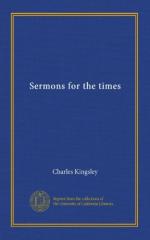SERMON XXII. PUBLIC SPIRIT
(Preached at Bideford, 1855.)
1 Corinthians xii. 25, 26. That there should be no division in the body; but that the members should have the same care, one of another. And whether one member suffer, all suffer with it; or whether one member be honoured, all rejoice with it.
I have been asked to preach in behalf of the Provident Society of this town. I shall begin by asking you to think over with me a matter which may seem at first sight to have very little to do with you or with a provident society, but which, nevertheless, I believe has very much to do with both, and is full of wholesome spiritual instruction for us all.
Did it ever happen to any of you, to see a mob of several thousands put to instant flight by a mere handful of soldiers? And did you ever ask yourself how that apparent miracle could come to pass? The first answer which occurred to you, perhaps, was, that the soldiers were well armed, and the mob was not: but soon, I am sure, you felt that you were doing the soldiers an injustice; that they would have behaved just as bravely if every man in that mob had been as well armed as they, and have resisted till they were overpowered by mere numbers. You felt, I am sure, that there was something in the hearts and spirits of those soldiers which there was not in the hearts of the mob; that though the mob might be boiling over with the greediest passions, the fiercest fury, while the soldiers were calm, cheerful, and caring for nothing but doing their duty, yet that there was a thought within them which was stronger than all the rage and greediness of the thousands whom they faced; that, in short, the seeming miracle was a moral and a spiritual miracle.
What, then, is this wonder-working thought which makes the soldier strong?
Courage, you answer, and the sense of duty. True; but what has called out the sense of duty? What has inspired the courage? There was a time, perhaps, when each of those soldiers was no braver or more steady than the mob in front of them. Has it never happened to you to know some young country lad, both before and after he has become a soldier? Look at him in his native village (if you will let me draw for you the sketch of a history, which, alas! is the history of thousands), perhaps one of the worst and idlest lads in it—unwilling to work steadily, haunting the public-house and the worst of company; wandering out at night to poach and caring for nothing but satisfying his gross animal appetites; afraid to look you in the face, hardly able to give an intelligible, certainly not a civil answer; his countenance expressing only vacancy, sensuality, cunning, suspicion, utter want of self-respect.
It is a sad sight, but how common a sight, even in this favoured land!
At last he vanishes; he has been engaged in some drunken affray, or in some low intrigue, and has fled for fear of the law, and enlisted as a soldier.




